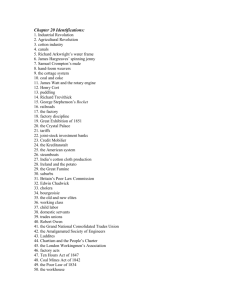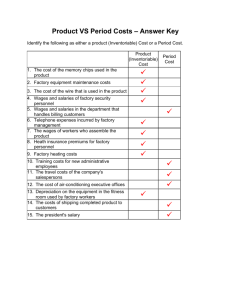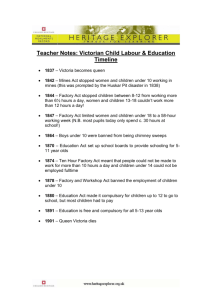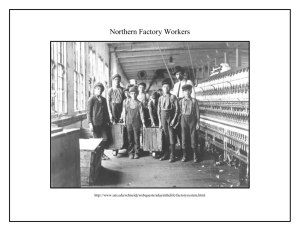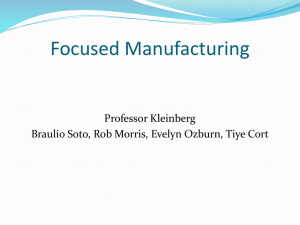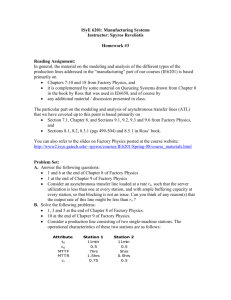1 The Apparel Truth – a Written Report by Ian Dixon Mission
advertisement
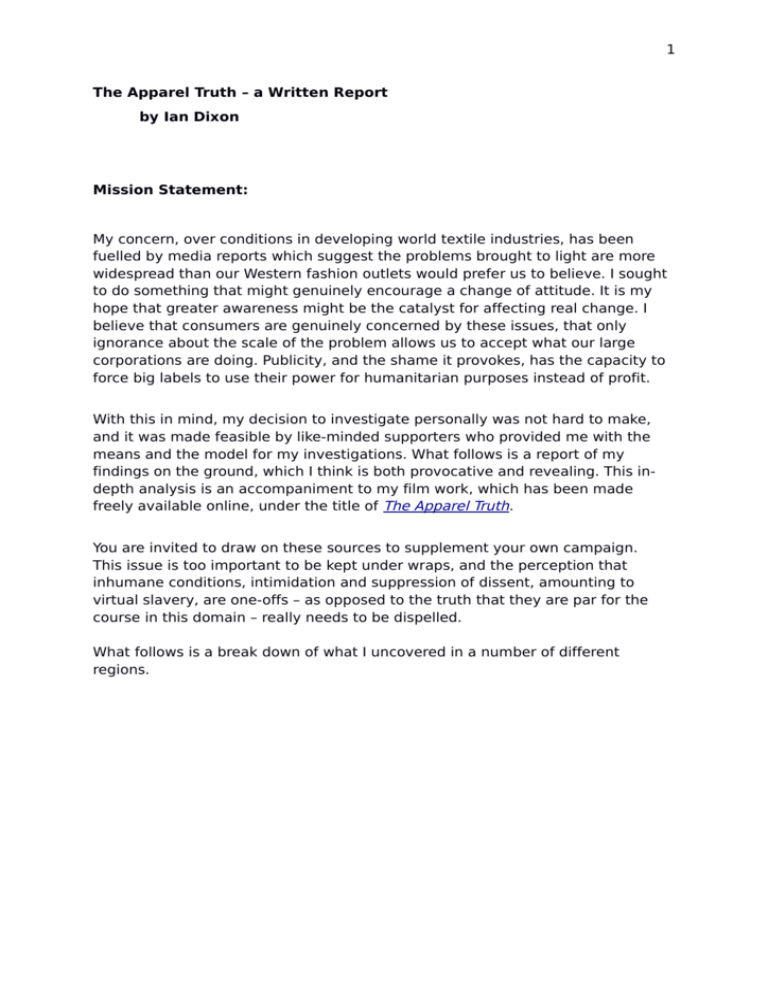
1 The Apparel Truth – a Written Report by Ian Dixon Mission Statement: My concern, over conditions in developing world textile industries, has been fuelled by media reports which suggest the problems brought to light are more widespread than our Western fashion outlets would prefer us to believe. I sought to do something that might genuinely encourage a change of attitude. It is my hope that greater awareness might be the catalyst for affecting real change. I believe that consumers are genuinely concerned by these issues, that only ignorance about the scale of the problem allows us to accept what our large corporations are doing. Publicity, and the shame it provokes, has the capacity to force big labels to use their power for humanitarian purposes instead of profit. With this in mind, my decision to investigate personally was not hard to make, and it was made feasible by like-minded supporters who provided me with the means and the model for my investigations. What follows is a report of my findings on the ground, which I think is both provocative and revealing. This indepth analysis is an accompaniment to my film work, which has been made freely available online, under the title of The Apparel Truth. You are invited to draw on these sources to supplement your own campaign. This issue is too important to be kept under wraps, and the perception that inhumane conditions, intimidation and suppression of dissent, amounting to virtual slavery, are one-offs – as opposed to the truth that they are par for the course in this domain – really needs to be dispelled. What follows is a break down of what I uncovered in a number of different regions. 2 Executive Summary This study sought to establish the prevalence of labour-law violations within the garment industry, and expel the notion that the individual sweatshops reported in the press were ‘surprises’ or ‘anomalies.’ The clothing companies associated with the notorious IBG factory in Jordan were selected as a case study: Wal-Mart, Nygard, J.C. Penney and Dillard’s. An investigation was led into the suppliers of these companies in Bangladesh (p.4), Cambodia (p.6) and Indonesia (p.10). This investigation included interviews with garment workers, worker’s unions and major charities, supported by surveillance, both overt and covert, of the factories themselves. Major violations were discovered at four of the factories investigated. These factories are known suppliers of Nygard (4), Wal-Mart (1), Gap (1) and Reebok (1). Violations included child labour, unfair wages, forced overtime and discrimination, as well as the refusal of basic entitlements such as annual leave, sick leave, maternity leave and the right to unionise. The multinational buyers must take responsibility for the poor conditions in these supplier factories. These violations are not anomalies: they are the product of an industry that seeks to minimise costs while ignoring human rights and the labour laws intended to uphold them. On April 14 2010, the Institute for Global Labour and Human Rights reported a catalogue of abuses at the International British Garments Factory in Jordan, a known supplier of Wal-Mart, Nygard, J.C. Penney and Dillard’s. i Workers were reportedly trafficked from Sri Lanka, Bangladesh and India, stripped of their passports and routinely forced to work over 110 hours a week. They were housed in appalling conditions and, moreover, cheated of around half their entitled pay. ‘A complete surprise,’ according to a statement by Nygard, the incident has been predictably portrayed as a one-off: an anomaly that slipped through the net of measures implemented to defend the rights of the workers supplying these clothing giants.ii Reforms have been made at the factory concerned. iii Yet although such appalling examples only occasionally find their way into the press, they are by no means extraordinary. Indeed the IBG factory is symptomatic of a more general system of exploitation. The constant pressure by international buyers for suppliers to reduce the cost of garments necessitates a brutal minimisation of production costs, including the suppression of workers’ rights. A broader investigation of the suppliers employed by these international buyers reveals the full extent and implications of this malpractice. 3 Shipping reports indicate that the following suppliers have been employed by Wal-Mart, Nygard, J.C. Penney and Dillard’s since 2010: Wal-Mart Bangladesh No recent order found Cambodia River Rich Textile Indonesia PT Ghim Li Indonesia Nygard Bangladesh Nafa Apparels Ltd. J.K. Knit Ltd. Southern Designers Ltd Southern Clothing Ltd Masihata Sweaters Ltd. Lovecraft Garments Cambodia 37644 Maxlin Ltd. Nan Kuang Garments Ltd. River Rich Textile Ltd. HS Enterprises Ltd. Guoxing Garments and Knitting Factory ltd. 4 Indonesia PT Micro Garment PT Doosan Cipta Busana Jaya PT Ungaran Sari Garments PT Wikasa Z PT Hua Sin Indonesia PT Tainan PT Wooin J.C. Penney Bangladesh Shade Fashions Ltd. Opex Stylewear Ltd. Intl Knitwear And Apparels Cambodia No recent orders Indonesia Pt.Tainan Enterprises Indonesia ll PT Hansoll Hyun PT Yutu Leports Jaya PT Handsome PT Domusindo Perdana PT Poongin Indonesia PT Anugerah Abadi Bersama PT Good Guys Indonesia PT Gunung Salak Sukabumi PT Star Camtex PT Olympic Garment International PT Harapan Busana Apparel PT Citra Abadi Sejati PT Makalot Industrial Indonesia PT Il Jin Sun Garment PT Glory Industrial Semarang PT Katexindo Citramandiri PT Norwest Industry 5 PT Cipta Dwi Busana PT Starlight Garment Semarang PT Korina Semarang PT. Samkyung Jaya Apparel PT Sai Apparel Industries PT. Rismar Daewoo Apparel Dillard’s Bangladesh No recent orders Cambodia No recent orders Indonesia No recent orders Bangladesh The conditions of the garment industry in Bangladesh are in general amongst the worst in the world. The 2006 Labour Law limited working time to eight hours a day with an optional two hours overtime. Nevertheless factories illegally force workers to work far longer hours. By setting unrealistic production targets they can demand that workers work extra hours –often unpaid – in order to meet a quota impossible to produce in the allotted time. Workers are rarely given notice before they are ordered to work overtime and, working long into the night, are given no respite, expected to start again at 8am. iv Conditions in the factory are often terrible. Factories are haphazardly thrown up and poor fire regulations have led to tragedies such as the Hameem factory in Dhaka that burnt down in December 2010, claiming 29 lives. v Clean water is often not made available and workers are pressured – explicitly or implicitly – not to use the toilet and thereby slow down production. Indeed, workers are known to deliberately dehydrate themselves to avoid getting into trouble over toilet breaks. Harassment is also extremely common: verbal, violent and sexual. Action Aid predict that around 20% of workers engage in sex in the workplace. vi These women are threatened with dismissal if they speak out against the demands made off them. Despite a hike in the minimum wage in 2010 workers wages start at 3,000 taka a month ($40). This wage falls significantly short of an acceptable living wage – that is enough to provide basic necessities such as food, clean water, 6 accommodation, health and education. Trade unionists calculate a living wage to be at least 5,000 taka, yet even this total would hardly liberate these workers who, for the most, live in tiny dilapidated structures in Dhaka’s sprawling slums. vii Lovecraft Garments Lovecraft Garments is a factory located on A.C. Roy Road in the Armanitola district of Old Dhaka. The company has recently supplied Nygard and previously supplied GAP. An interview with several Lovecraft workers gives insight into the conditions in which they are forced to live and reveal that the factory is breaking several labour laws. The factory obligates workers to work a minimum of ten hours a day, six days a week and can demand as much as thirteen hours a day. Bangladeshi labour law states that a working day should be no longer than eight hours with an additional and optional two hours of paid overtime. By working overtime the women can earn a total wage of around 4000 taka a month ($53). On this wage the workers cannot provide for themselves, and therefore lodge with their uncle. Their family of ten can afford one small room in which to cook, sleep and live, taking turns in the single bed. A street of a dozen such families share one toilet and water supply. The workers seemed confused when asked about their holiday entitlements. Apparently they are offered compensation for not taking any time off work. Although this extra income is appreciated by the impoverished workers, the practice is illegal and leads to exhaustion. The factory offers half the legal requirement of maternity leave: just eight weeks. The workers are therefore forced to work gruelling hours in the latter stages of pregnancy endangering the health of both mother and child. The factory also provides no child care, despite the fact that it is a legal requirement. As childcare or schooling represents another crippling expense, many workers are forced either to send their children to stay with family in rural areas or let them grow up on the streets. Attempts by workers in the industry to improve their working conditions are met with suppression. Factory owners routinely hire goons to intimidate workers and break up unions, denying workers freedom of association. Shahida, a spokesperson for the National Garment Workers Federation (NGWF) divulged that as a worker she was threatened daily by a group of men with rape and violence if she did not drop the case she had raised against the factory. viii On the 3rd August 2011 Sommilito Garment Sramik Federation (SGSF) – a Garment Workers’ Union 7 Federation – was attacked by 40 local goons apparently hired by the owner of Union Garments Ltd.ix The union was representing workers demanding compensation from the factory and had ignored threats and demands to drop the case. Ten labour activists and several garment workers were injured in the attack as they fought off the goons at the union’s offices in the Mokhali district of Dhaka. Despite such blatant violations of human rights the government remains squarely on the side of the factory owners. Of the three hundred elected MP’s in the National Assembly twenty-nine own garment factories themselves, and more than half are closely related to a factory owner, including both Prime Minister Sheikh Hasina and leader of the opposition Khaleda Zia.x Though complaints can be taken to the courts there are widespread reports of corruption and judges often delay cases for so long that workers are unable to maintain their commitment.xi Multinational buyers are responsible for these atrocious standards, explains Amirul Haque Amin, President of the National Garment Workers Federation (NGWF).xii Multinational buyers can make significant demands of suppliers, threatening to take their business to a different factory or country. However, this power is exploited rather to increase profits than to enforce labour rights. Although they ensure they are seen to put pressure on the suppliers to improve working conditions the buyers simultaneously demand increasingly low prices. Factory owners consequently make few improvements in order to maintain profitability. Various gestures are made in pretence of working standards but often to little effect. For example, although legislation now demands that factories provide childcare, the low standards of this service, even where it is enforced, mean that the majority of mothers prefer for their children to play in the slums. At Southern Designers, a supposedly reputable factory that supplies Nygard and employs over a thousand women, one small room and one supervisor are provided.xiii Only a handful of children attend. NGWF campaign that only through a ‘fair price’ offered by multinational buyers can workers achieve a ‘fair wage’ and the rights that go with it. Cambodia Many of the issues in Bangladesh are shared by the Cambodian garment industry. The minimum wage is higher at $61 per month. However, the cost of living is also higher and the total is not considered to be adequate in providing the basic needs of workers.xiv Workers interviewed admitted that they could not consider starting a family as they could only just support themselves. xv Another woman relayed that she could not afford to accommodate and educate her children in the capital where she works and they therefore live many miles from her with other relations.xvi Tola Moeun, head of the labour program the Community Legal Education Centre (CLEC) in Phnom Penh, explains that the wage cannot provide even an adequate diet for workers and their dependents. xvii The Cambodian Ministry of Planning has claimed that an individual needs to 8 spend at least $1.75 dollars a day to purchase an acceptable amount of food. On average workers in Cambodia spend around $0.25 a meal. This diet does not provide the calories and nutrition needed to maintain health. When coupled with the outrageous hours demanded in many factories CLEC believe this lifestyle leads to a noticeable deterioration of the workers’ health in as little as six months from joining the industry. In 2010 and 2011 thousands of Cambodian garment workers have fainted at work. xviii Moreover, most cannot afford medicine and if they contract a serious disease such as typhoid they must rely on support from friends or family, or perish. River Rich Garments River Rich Garments is a factory located in Prek Ta Pring Village, Sethbo Commune, Saang District, Kandal Province. The company is notorious and currently supplies both Wal-Mart and Nygard. In 2007 the dismissal of union founders led to a mass strike demanding just working conditions and freedom of association.xix An agreement was eventually reached. xx Nevertheless, according to a study by CLEC, the company are once again violating various labour laws and human rights.xxi Workers report that around 10% of the workforce are juveniles. However this is hard to prove as the factory reportedly forges documents as proof-of-age. Workers are forced to work between ten and twelve hours a day, seven days a week. In addition to the standard eight-hour working day, a further two hours of ‘normal overtime’ is mandatory in the low season, and four hours ‘occasional overtime’ in the high season. For the ‘normal overtime’ workers are compensated with 1500 Riels (around $0.19 per hour); for the ‘occasional overtime’ they are paid 2500 Riels (just over $0.15 per hour). Legally such overtime should be optional. The workers are rarely allowed holiday. Sundays and public holidays can only be taken off if the company has no orders. If workers fail to come to work on Sundays/ public holidays three times they are dismissed. Similarly, although workers are entitled to 18 days annual leave, they are only granted this leave in special circumstances such as if they are getting married. Instead this holiday leave is converted into cash. As at Lovecraft, the impoverished workers welcome this extra income but the practice is illegal and leads to exhaustion. Although workers are entitled to paid sick leave – to a maximum of two days – the factory insists that they provide a sick note from a designated hospital. As the workers cannot afford the fees necessary to procure this document they must either go unpaid or return to work before they have recovered. If the 9 workers require more than the two days leave they are given three warnings, suspended and then dismissed. The factory does not offer any paid maternity leave. Workers instead are expected to take a couple of unpaid days to recuperate before beginning work again under a new probationary contract. Cambodian law demands factories provide 90 days maternity leave at 50% pay, and that the worker should be allowed to return to the post which she left. Instead the factory pays a small ‘baby allowance,’ yet the sum is not adequate compensation for the workers’ entitled leave and denies the mother her right to spend time with her newborn child. Moreover, forcing the mother to work long hours in the latter stages of pregnancy jeopardizes the health of both mother and her child. The factory prefers to rid themselves of pregnant workers and their associated costs. Although they do not dismiss pregnant women outright, workers claim that the factory uses other ways of pressurising expectant mothers to resign. Trade Unions are suppressed at the factory, denying workers their right to freedom of association. Following the nationwide strike in September 2010, when the workers returned to the factory 150 trade union leaders and activists were denied entry. Following legal action most have now been reinstated. Nevertheless the factory often refuses to cooperate with the unions, postponing meetings or refusing to negotiate workers’ grievances. Workers on fixed duration contracts are often dismissed or have their contract cancelled if they join the union. The factory does not provide a meeting room for union activity and union representatives normally have to meet their members during the lunch break under close observation by the factory guards. Another major problem in Cambodia is the use of the fixed duration contracts. xxii Ath Thorn, president of the Coalition of Cambodian Apparel Workers' Democratic Union (C.CAWDU), explains that short term contracts, typically of around 2 to 3 months, are used to remove inconvenient employees and effectively blackmail workers into compliance with the factories’ demands. xxiii Workers are unable to complain about conditions in the factory as they will not have their contract renewed. Similarly, should they refuse to work overtime they will not have their contract renewed. This ploy is also used to rid the factory of members of the unions and pregnant workers. Nan Kuang Garments Nan Kuang Garments is a factory located in Damnak Thom Village, Steang Mean Chey District, Phnom Penh. The company produces clothes for Nygard and Reebok amongst others. On 4 th August 2011 500 workers at the factory went on strike in protest of the company’s ill-treatment of its employees. 10 The factory employs under-aged girls, a claim substantiated by the admission of a 15 year old worker outside the factory. They illegally take these girls on in exchange for cheaper labour costs. The grateful teenagers forego their transport allowance, work long hours of overtime and accept a pitiful wage. The girl interviewed revealed that she was paid $30 a month, less than half the minimum wage. The factory reportedly forces workers to do overtime, typically demanding between ten and twelve hours a day, six days a week. The factory does not provide any paid sick leave. They demand that sick workers continue to come to work. This obviously hinders the recovery of the afflicted worker and encourages the spread of disease. The factory reportedly discriminates against pregnant workers. It recently dismissed two women for becoming pregnant to avoid paying for their maternity leave. These women now have no source of income with which to support themselves through pregnancy and provide for their children. This grave injustice represents more than a breach in labour law: it is a gross violation of the human rights of both the mothers and the unborn children. As in Bangladesh, responsibility for these violations must lie partially with the multinational buyers. With their insistence, poor practices such as fixed duration contracts could be prevented. With more conscientious pricing they could fund better working conditions and a higher minimum wage. Ath Thorn believes that the commitment of these companies runs only as deep as to avoid numerous public complaints.xxiv Beyond their own financial interest, he argues, they simply do not care. Indonesia Many of the issues discussed in regard to Cambodia and Bangladesh are also common in Indonesia. Unrealistic production targets are used to force workers into unpaid overtime. Fixed duration contracts are used to dismiss labour activists, pregnant workers and the sick. xxv Wages are too low to support a decent standard of living. The minimum wage varies depending on district, but according to a survey by SPN, a national garment workers' union, the average basic wage for workers in the industry is 833,475 Rupiah ($94.50). xxvi The survey suggests that on average this goes around 57% towards fulfilling decent living necessities. In order to meet their basic needs workers commit to many hours of overtime. A worker interviewed relays that she can finish work at midnight and be expected to start again at 7.30. xxvii Workers also turn to loan sharks, necessity often driving them into perpetuating circles of debt. xxviii 11 As elsewhere, trade unions are suppressed as far as possible. Workers are often dismissed if they join a union. Lilis Mahmudah, chairperson of SPN, relays that many union leaders – herself included – have been accused of trumped up charges such as theft in order to undermine their campaign for labour rights. xxix PT Micro Garments PT Micro is a factory located on Jl. Raya Rancaekek, Majalaya, Bandung. The company is a known supplier of Nygard. Its workers have recently taken action against the appalling violations of labour laws in the factory. xxx The factory pays its workers less than minimum wage. The wage system is based upon units of goods produced rather than time worked. This piece rate is unfair, and forces the workers into excessive hours of overtime in order to earn a sufficient wage. When the factory has no orders it announces a ‘rest time’ during which both permanent and short term contract workers receive no wage. This contravenes the workers’ contracts which offer paid employment for the given length of time. Short-term-contract workers at the factory are dismissed or laid-off unilaterally, without any compensation. According to Indonesian labour law such dismissals should be discussed with the workers’ union beforehand, a regulation that the factory ignores. Moreover many of those dismissed are entitled to permanent status and the consequent right to compensation, yet irregularities in the implementation of their contract agreement mean that they do not receive the rights due to them. The factory refuses to grant the paid annual leave that every worker is entitled to. In order to attend events such as marriages or funerals workers are therefore forced to forfeit their wage. Given the workers’ dependency on their meagre income, this violation threatens to dislocate them from society and the networks of family and friends often needed for support. Similarly the factory does not offer any sick leave. The worker is forced either to return to work while still sick, or to endure their illness with no income. Furthermore, in yet another clear violation of Indonesian labour law, not all employees are registered with the Health Care Program. As a result they cannot afford any necessary medicines. By stripping the worker of their means of support while they are at their most vulnerable, the factory is not only violating Indonesian labour law but attacking their employees’ most basic human rights. 12 The factory does not offer any paid maternity leave. Workers are forced to work in the final stages of pregnancy, jeopardizing the health of mother and child. They are then forced to return to work as quickly as possible denying the mother her right to spend time with her newborn baby. Trade unions are suppressed within the factory denying workers their right to freedom of association and undermining efforts to improve working conditions. Union members are often threatened, normally with demotion. The factory does not provide an office or other necessary facilities for the unions to conduct their business. Similarly if a union leader needs to perform duties outside of the factory during the working day they are not given their wage. Following a breakdown in negotiations between the factory and the internal trade union (GSPB) a strike was called on 16 th December 2010. Over 500 workers took part. In response, the factory, in collusion with local officials, tried to bribe and threaten the trade union into liquidation. Although four members accepted a payoff of around 18,000,000 Rupiah per person ($2040) they failed to sway GSPB’s Chairman, Nanang Ibrahim. Instead on 21 st February 2011 the factory resorted to dismissing Mr Ibrahim on trumped up charges of failing to come to work. A further 462 workers have since been dismissed without due process or compensation. The workers have responded with further strikes which have been met with aggression by local police forces. On the 27th May a pregnant worker was kicked by a policeman, losing her baby.xxxi Once again the attitude of the multinational buyers is at best neglectful. Mr Muhtar, chairman of the workers’ union at PT Wooin, suppliers of GAP and Nygard, relays that the factory inspections by these multinational buyers are superficial.xxxii Representatives do not attempt to interview workers or ask about their concerns. The union is campaigning for the factory to provide food and water for the workers as well as transport to and from the factory. Neither GAP nor Nygard have approached the union to offer their support. They have not even offered the workers their contact details. Improvements may have been made at the IBG factory in Jordan, yet they are embarrassingly reactive. With further violations so accessible elsewhere – across three different countries – we can dismiss claims that these companies pursue any kind of successful policy protecting the rights of their workers. Moreover this amounts to more than mere neglect. Essentially running an oligopsony, multinational buyers such as Wal-Mart Nygard, GAP and Reebok can make significant demands of suppliers, threatening to take their business to a different factory or country. However, they exploit this power rather to increase profits than to enforce labour rights. Although they ensure they are seen to put pressure on the suppliers to improve working conditions, these companies simultaneously demand increasingly low prices. In order to provide these prices and keep their custom, factory owners are arguably forced to maintain the poor conditions that 13 pervade across the industry. These instances are not unfortunate anomalies or mistakes: they are symptomatic of an industry that is still prepared to ignore human rights in the quest for greater profits. i ii iii iv v vi vii viii ix x xi xii xiii xiv xv xvi xvii xviii xix xx xxi xxii xxiii xxiv xxv xxvi xxvii xxviii xxix xxx xxxi xxxii

